- Home
- Joel Goldman
Lou Mason Mystery - 02 - The Last Witness Page 3
Lou Mason Mystery - 02 - The Last Witness Read online
Page 3
Mason had been up against Ortiz enough times to appreciate his plodding, understated style, which could lull a defense attorney into careless mistakes. Juries responded to him, seeing him as one of them. He was a regular guy who just talked to the jury, making the complex simple, explaining why the alibi was just a lie. He had the highest conviction rate of anyone in the prosecutor’s office and was always the lead prosecutor in death-penalty cases.
“I’ve got some other things to go over with Blues. Let me know when I can get a set of the investigative reports, or are you going to make me wait for discovery?”
“I told Campbell you’d want that. You can get them tomorrow morning. In the meantime, I’d like to get a swab from your client’s mouth so we can run the DNA test.”
“Let’s see how things go in the morning, Harry.”
“You can agree or we can get a warrant. Either way, it doesn’t matter to me. We won’t have any trouble finding your client. Just tell him that when the judge imposes a sentence, he’ll ask us if Bluestone cooperated or made life difficult.”
Mason was tired of Harry’s pinpricks. “I know you’ve had a hard-on for Blues since the two of you were partners. Don’t use this case to get even. Blues’s life is on the line, and you’re too good of a cop to make it personal.”
Harry fired back. “Is that what you think? That this is personal? Well, let me tell you something, Lou. It’s damn personal! Your client killed an unarmed, innocent woman and walked away. He killed Jack Cullan last Friday, and if he thinks he’s walking away this time, he’s wrong. Murder is about as personal as it gets, and I take it real personal that I didn’t nail the son of a bitch the first time.”
Harry’s rant attracted the stares of the other detectives jammed onto the floor. Mason looked around the room. They all knew about Blues and Harry. Though cops never liked it when one of their own was busted, Blues was no longer a brother behind the shield.
“You won’t nail him this time either, Harry. I won’t let you.”
CHAPTER EIGHT
“You don’t look like a lawyer who just convinced the cops to let his client go home,” Blues said when Mason returned to the interrogation room.
“The case Harry told me he has against you doesn’t worry me. It’s the one he wouldn’t tell me about that should worry both of us.”
Mason had always been impressed at Blues’s ability to occupy a room. Though tall and muscular, he wasn’t always the biggest man, but when he was backed up, he grew a foot higher and wider with the menace he promised.
“You got something to say, Lou—just say it.”
Mason let out a long breath. “Okay. Blood and tissue were found under Cullan’s fingernails. They checked the blood type against the blood type in your police department personnel file and got a match. They want a swab for DNA testing.”
“So what. He scratched me. Who else’s blood could it be?”
“None of the witnesses in the bar saw Cullan scratch your hands, but they will testify that you threatened Cullan.”
“So I’ll testify.”
“You know what they call a defendant who testifies? Convict. I told Harry that his case still sucked unless he could put you at the scene.”
Blues stared at Mason, hands on his hips. “You told him his case sucked? That’s strong. I’ll bet he gave up right then.”
“Almost. I asked him what else he had, and he said it was enough for the prosecuting attorney to consider asking for the death penalty. He said you got away with murder once before and that he’s not going to let you get away with it again.”
Blues turned away. Mason expected the news to knock him back. Instead, Blues gathered himself, straining as if he would break out of the interrogation room by sheer will.
“What do you think?”
“I think a lot of clients hold back information from their lawyers. They want to look their best, their most innocent, especially when they’re not. Shit, half of them probably undressed in the dark on their wedding nights so they wouldn’t disappoint their spouse.” Mason paused. “I think Harry’s case sucks unless he can place you at the scene. I need to know if he can.”
Blues paced once around the small room, stopping with his back to the two-way mirror, and folded his arms against his chest.
“I wasn’t there and I didn’t kill Jack Cullan.”
“I’ll be sure to mention that to the judge. You’ll be arraigned tomorrow morning in front of an associate circuit court judge, who will set bail. I’m guessing bail will be no less than a quarter million and maybe as much as half a million.”
“The judge won’t grant me bail.”
“Hey, give me some credit. You’ve got substantial ties to the community. You’re not a threat to anyone else. Carlos Guiterriz will bond you out. The bar will be more than enough collateral. You’ll be out by lunchtime.”
“You don’t get it, Lou. Charging me with murder one and threatening me with the death penalty is a power play to make me take a deal. Somebody wants me to go down for this, and keeping me in the county jail until trial will be the next card that gets played. Make an ex-cop spend the winter in the general prison population, and see how long it takes him to find religion. If I don’t roll over, they hope I’ll get shanked before the trial. The last thing I’ll hear is, ‘Enjoy your stay at the Graybar Inn.’”
“Harry wouldn’t do that.”
“Oh, Harry would do it, except it’s not up to Harry. He’s just carrying water for the chief, or the prosecuting attorney, or whoever doesn’t want my case to go to trial.”
“This isn’t the Conspiracy Hour. Cullan was connected to everybody in town, but he would have had to own everybody—the police, the courts, and the mayor—everybody for you to be right. Plus he’s dead. All the IOUs he held have been canceled.”
“How are you going to prove I’m innocent?”
“Find out who killed Cullan.”
“You’ll have to peel the layers off of his life, read every one of those IOUs.”
Mason nodded, grabbing the thread that held Blues’s fears together. “Cullan was probably killed by someone who wanted to cancel an IOU and who won’t mind if you take the fall. If Cullan owned half the people the Star claims he did, there will be plenty of pressure to keep your case from coming to trial. Otherwise, I’ll hang every dirty piece of laundry I can find in front of the jury to convince them that someone else did it.”
“That’s why I won’t get bail. Remember something else while you’re out there stirring up this shit pot.”
“What’s that?”
“The killer won’t mind killing again to make sure I go down.”
CHAPTER NINE
Associate circuit court judge Joe Pistone’s courtroom was on the eighth floor of the Jackson County Courthouse, a neoclassical monument to the durability of public works projects built during the Depression. It was on the east side of downtown, across the street from city hall, another monument cast from the same mold. Police headquarters, an uninspired squared fortress, was one block east on Locust. The three buildings, all hewn from Missouri limestone, formed Kansas City’s triangle of legislative, judicial, and executive order. The courthouse was eight stories and police headquarters was six. City hall loomed over both of them at thirty stories. The branches of government may have been equal on paper, but the daily grind of governing required considerably more people and space than public safety or justice.
Mason passed through the metal detector in the courthouse rotunda, hurrying up to wait for the elevators. The job of operating the courthouse elevators had been one of the last county patronage jobs to succumb to modern technology. Since the courthouse opened in the 1930s, loyalists at the bottom of the political food chain had been rewarded with the stupefying opportunity to sit for hours at a time on a small stool and bounce the elevators from floor to floor. Over the years, they had perfected a herky-jerky stop-and-go technique that left most passengers gasping when the doors opened at their floor. When the anc
ient elevators and their equally ancient operators were replaced, the county installed new elevators that ran smoothly, but slowly enough to drive even the most exercise averse to use the stairs.
Associate circuit court was the home of rough justice. Rules of evidence and procedure were loosely applied to hasten the endless passage of collection, landlord-tenant, and traffic cases through the system. The judges carried the same honorific title as their circuit court brethren, though many lawyers treated them behind their backs like minor leaguers. The one exception was the criminal defense attorney whose client stood before the judge seeking bail in an amount the defendant could make. At those moments, the lawyers meant it when they called the judge “Your Honor.”
Reporters had gathered outside the courtroom, creating a media gauntlet. Mason ignored the questions they tossed in his path, smiling politely without answering until Rachel Firestone stepped in front of him. He recalled her tenacious pursuit of him in the aftermath of the bloody demise of his last law firm, Sullivan & Christenson.
“Listen,” she had told him. “This story is going to be written whether you like it or not. You are the story. Talk to me.”
“Not interested,” Mason had told her. “Too many people are dead. Let them be.”
Rachel wrote the story, quoting his refusal. She sent him a copy with a note saying she hoped he liked it and asking him to call her. Mason threw the note and the article away.
She had short-cropped dark red hair, alabaster skin, and dancing emerald eyes. Her trim, athletic build matched the nervous energy she radiated like a solar flare.
“Welcome back to the meat grinder,” Rachel said. “Care to talk?”
“No.”
“Wrong answer. I’ll give you another chance later,” she said before pushing her way into the courtroom and a seat directly behind the prosecutor’s table.
Joe Pistone’s legal career had been spent in associate circuit court, the first twenty-five years as a lawyer and the last fifteen as a judge. He had white hair, a thin face, and shoulders that were hunched like those of a man who’d spent his life ducking trouble. He rarely looked at the lawyers or the litigants, keeping his head down and the cases moving.
Judge Pistone’s courtroom was small enough to be crowded if more than a handful of people were present for a case. When there was a docket call for first appearances in criminal cases, the courtroom shrank as the jury box was filled with defendants dressed in orange jailhouse jumpsuits, their hands and feet shackled.
There were two counsel tables, one for the prosecution and one for the defense. The pews behind the rail that separated the lawyers and judge from the public were filled with family members of defendants and victims who divided themselves like the bride’s side and the groom’s side.
Inexperienced lawyers who didn’t arrive in time to sit up front wedged themselves into any empty space they could find, while the veterans hung around the judge’s bench as if they were at a local bar. Toss in the media pack and the courtroom was standing room only when Patrick Ortiz made his way to the prosecution’s table, trailed by two assistants.
“Morning, Patrick,” Mason said, extending his hand.
“Lou, good to see you,” Ortiz answered, shaking Mason’s hand without conviction.
Mason was six feet tall, with a hard, flat body kept in shape on the rugby field and a rowing machine he kept in his dining room. Ortiz was a head shorter and had the irregular rounded shape of someone whose diet was limited to foods that end in the letter O. Mason sat on the edge of the prosecutor’s table, a friendly adversary chatting up the opposition.
“I’m here on Wilson Bluestone.”
“So I’ve been told. These are for you,” he said, handing Mason a copy of the police reports. “You’ll get the rest in discovery.”
“I’ll keep that in mind,” Mason answered as he skimmed through the pages.
“Sign this,” Ortiz said, and slid a single sheet of paper toward Mason.
Mason picked it up. It was a consent form authorizing the state of Missouri to obtain a DNA sample from Wilson Bluestone, Jr. Mason signed it and handed it back to Ortiz.
“You want to talk about a plea, come see me this afternoon,” Ortiz told him.
“My client’s only plea is innocent. I don’t expect you to agree to release him without bail. How much are you looking for?”
“No bail. That’s what I’m looking for.”
Before Mason could respond, three deputy sheriffs led Blues into the jury box. After a night in jail, clad in Day-Glo orange with his hands and feet manacled, he looked like a flight risk and a danger to the public.
They made eye contact. Mason shook his head, telling Blues all he needed to know about the prosecutor’s position on bail.
CHAPTER TEN
Judge Pistone made his entrance as the bailiff called the courtroom to order.
“Good morning, Counsel,” the judge began. “We’ll take the video arraignments first.”
A projector mounted on the wall directly above the table for defense counsel beamed a six-foot-by-ten-foot image on the opposite wall. The picture was grainy and washed-out. The audio was a beat behind the image, and the transmission speed was somewhere between real time and slow motion. The proceedings had the look and feel of justice administered in the middle of a bad dream.
Each defendant appeared on-screen, an oversized head shot that magnified every tremor and twitch. The last defendant was a young boy Mason guessed was barely twenty. He tried to retreat from the camera, his lips quivering as he tugged at his chin. The judge read the charge and the maximum sentence for the offense.
“You are charged with forcible rape, a Class A felony for which the maximum penalty is life in prison.”
The boy whipped his head up at the camera, his mouth gaping at the judge’s words.
“Do you have an attorney?” The boy shook his head. “Very well. The public defender will come see you.”
The picture disappeared. Mason had the feeling the boy was as lost as the image that had been on the wall.
“The next case is State of Missouri v. Bluestone,” Judge Pistone announced. “State your appearances, Counsel.”
Patrick Ortiz stood and announced, “The people of the state of Missouri appear by Patrick Ortiz, deputy chief prosecuting attorney.”
Mason followed. “The defendant appears in person and by his counsel, Lou Mason. We’re ready to proceed, Your Honor.”
“Very well, Counsel,” the judge said without looking up. “The defendant will rise.”
Blues stood from his seat in the jury box. Mason could hear the faint etching sounds of the courtroom artists.
Judge Pistone continued. “The defendant is charged with the crime of murder in the first degree in the death of Jack Cullan. Does the defendant understand the charges or wish to have them read?”
“We’ll waive the reading of the charges, Judge. We’d like to discuss bail,” Mason said.
“What’s the state’s position, Mr. Ortiz?” the judge asked.
“The people oppose bail in this case. The defendant is a former police officer who was forced to resign because of a shooting death that violated departmental rules on the use of deadly force. He has an extensive history of violent conduct. Though we acknowledge his ties to the community, he’s both a flight risk and a danger to the public.”
“Mr. Mason?”
“Your Honor, my client is entitled to bail. He owns a business that will be shut down if he’s not there to run it. Everything he owns is tied up in that business and he’s not about to run out on that. Mr. Ortiz is correct that the defendant is a former police officer. He’s wrong about the defendant’s history. He’s never been charged with or convicted of any crime. The state’s evidence in this case is as thin as yesterday’s soup. While the victim was a high-profile member of the community, the court should reject any pressure to deny my client bail.”
As soon as the judge looked up for the first time that morning, Mason knew h
e’d hit the wrong nerve.
“Mr. Mason, if you have any basis for suggesting that someone is attempting to improperly influence this court or that I would be susceptible to such attempts, now is the time to share that with me.”
The color rose in Mason’s neck. He refused to look at Ortiz, who, he was certain, was smiling wide enough to suck down a bag of Doritos. He couldn’t look at Blues.
“I didn’t mean any reflection on the court, Your Honor. All I meant was that the state is pushing a lot harder on my client than they would in any other case with this kind of evidence. Whatever the reason for that, it’s not sufficient to deny bail.”
“You can take that up with the circuit judge who gets assigned to this case. Bail denied. We’re adjourned.”
Mason was beginning to believe that Blues was right. Even though he had roused Joe Pistone’s slumbering judicial dignity, the decision on bail had already been made. Mason’s gaffe had given the judge all the cover he needed.
He weaved through the media throng, making his way into the hallway that connected to the judge’s chambers. It was the route by which Blues would be taken back to the county jail. He caught up to the sheriff’s deputies and Blues just as they were getting onto the elevator.
“Mind if I get a word with my client?” Mason asked one of the deputies.
“Make it fast. This ain’t a parade,” the deputy said.
Mason pulled Blues by the arm as far from the deputies as he could without getting them too excited.
“Listen, I’m sorry about what happened in there, but I don’t think it would have made any difference.”
“It’s cool, man,” Blues said. “Like I told you, they’re going to try to squeeze me.”
“We’ll get another chance in front of the circuit court judge. Ortiz can either ask for a preliminary hearing or take the case to the grand jury. I’m betting on the grand jury. That way he doesn’t have to tip his hand. The grand jury meets every other Friday. The next session is a week from tomorrow. Once you’re indicted, we can ask the circuit court judge to set bail.”

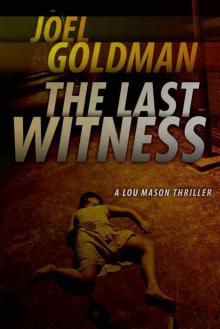 The last witness lm-2
The last witness lm-2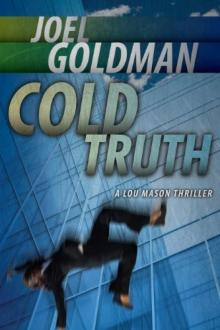 Cold Truth
Cold Truth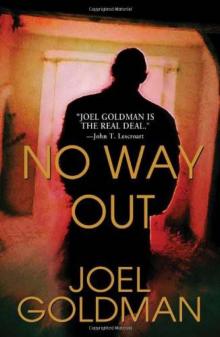 No Way Out (2010)
No Way Out (2010)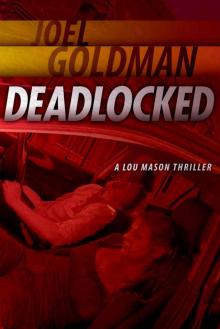 Deadlocked (Lou Mason Thrillers)
Deadlocked (Lou Mason Thrillers)![[Lou Mason 01.0] Motion to Kill Read online](http://i1.bookreadfree.com/i1/03/24/lou_mason_01_0_motion_to_kill_preview.jpg) [Lou Mason 01.0] Motion to Kill
[Lou Mason 01.0] Motion to Kill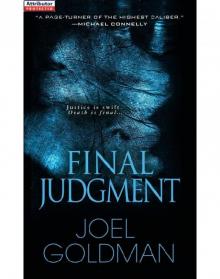 Final Judgment
Final Judgment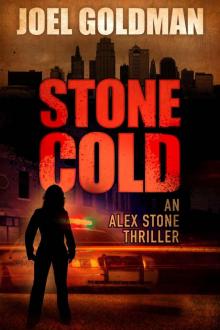 Stone Cold
Stone Cold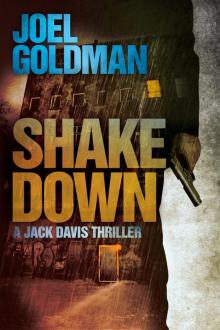 Shakedown
Shakedown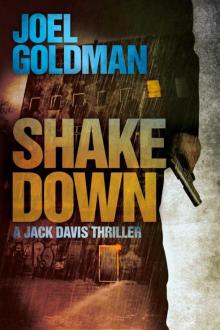 Shakedown jd-1
Shakedown jd-1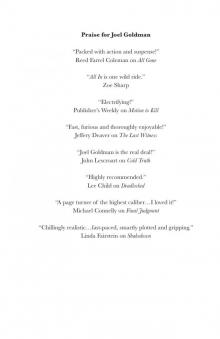 All Gone
All Gone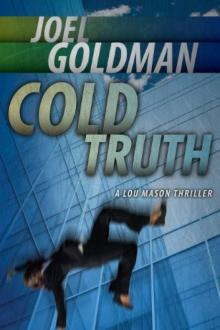 Cold truth lm-3
Cold truth lm-3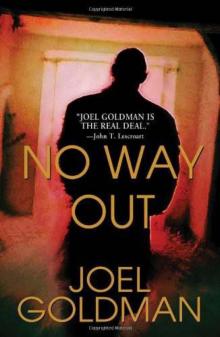 No way out jd-2
No way out jd-2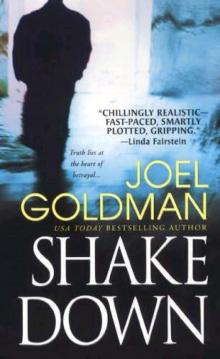 Jack Davis Mystery - 01 - Shakedown
Jack Davis Mystery - 01 - Shakedown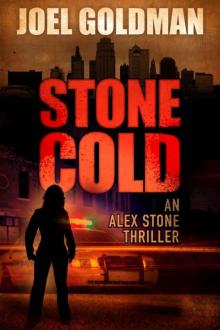 Stone Cold as-1
Stone Cold as-1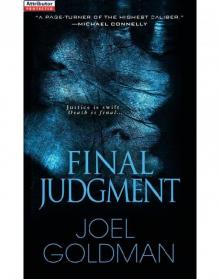 Final judgment lm-5
Final judgment lm-5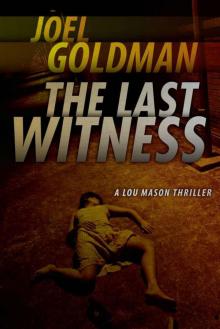 Lou Mason Mystery - 02 - The Last Witness
Lou Mason Mystery - 02 - The Last Witness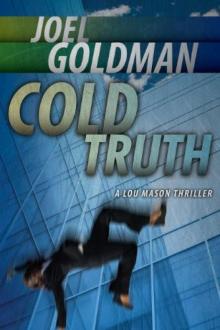 Lou Mason Mystery 03-Cold Truth
Lou Mason Mystery 03-Cold Truth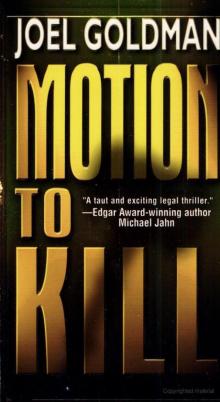 Motion to Kill
Motion to Kill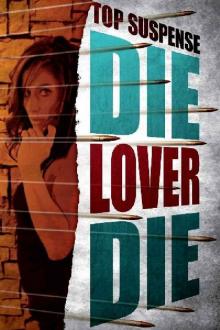 Die, Lover, Die!
Die, Lover, Die!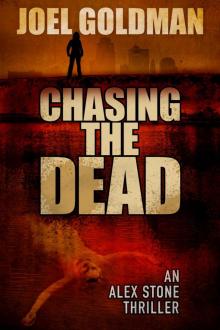 Chasing The Dead (An Alex Stone Thriller)
Chasing The Dead (An Alex Stone Thriller)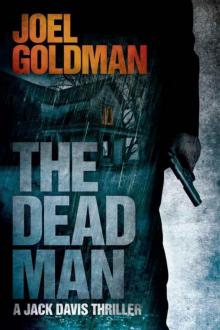 The Dead Man
The Dead Man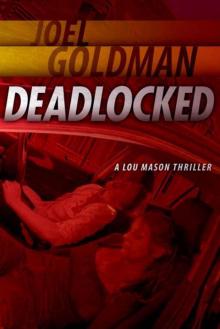 Deadlocked lm-4
Deadlocked lm-4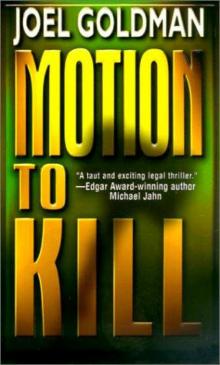 Lou Mason Mystery - 01 - Motion to Kill
Lou Mason Mystery - 01 - Motion to Kill Die, lover, die
Die, lover, die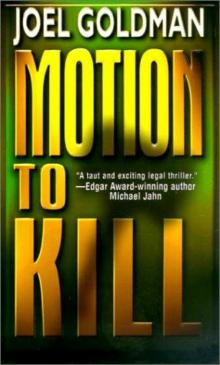 Motion to Kill lm-1
Motion to Kill lm-1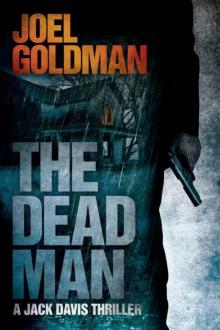 The Dead Man jd-3
The Dead Man jd-3